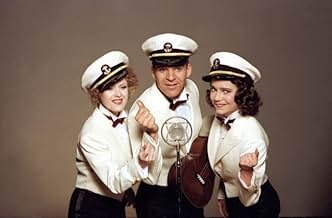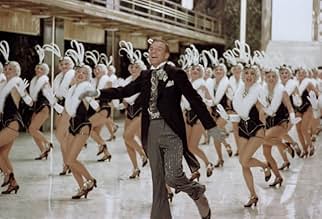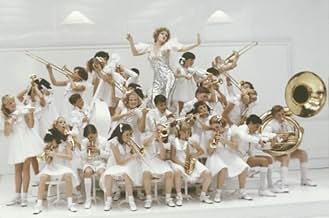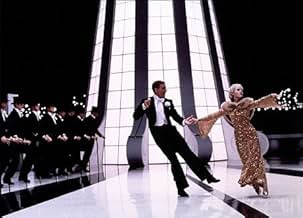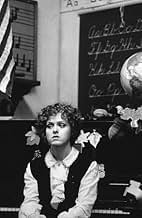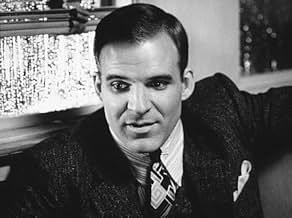CALIFICACIÓN DE IMDb
6.5/10
6.6 k
TU CALIFICACIÓN
Durante la Gran Depresión, un vendedor de partituras busca escapar de su vida aburrida a través de la música popular y una historia de amor con una maestra de escuela.Durante la Gran Depresión, un vendedor de partituras busca escapar de su vida aburrida a través de la música popular y una historia de amor con una maestra de escuela.Durante la Gran Depresión, un vendedor de partituras busca escapar de su vida aburrida a través de la música popular y una historia de amor con una maestra de escuela.
- Nominado a 3 premios Óscar
- 3 premios ganados y 9 nominaciones en total
Francis X. McCarthy
- The Bartender
- (as Frank McCarthy)
Shirley Kirkes Mar
- Tart
- (as Shirley Kirkes)
Opiniones destacadas
This film has so many good things in it and so much talent worked so very hard on it that it's just baffling to me that so much of it doesn't work. I love '30s and '40s musicals, and I saw this film in 1981, and I've seen it about 10 times more on DVD. I like a lot of it, but somehow it's just not a very good movie, and I still can't figure out why.
The music is good. The musical numbers are creatively shot and well-executed; the Walken number alone took weeks to film. The sets, costumes, photography, and color are beautiful and give the film a real Depression feel. Clearly, no expense was spared. The actors give it their all. The re-creations of photos and paintings (including "Nighthawks" which is actually from WW2) are breathtaking. They must have been very hard to set up, light, and shoot. But, in keeping with the film's low-key style, they're not lingered on at all, and if you look away you can miss them.
Is the problem Steve Martin? This choice caused some controversy in 1981. He lacked film experience and he might not have been the ideal choice, although it's hard to guess what other leading man could have done that vaudeville stuff in 1981. Martin, at least, doesn't obviously fall down on the job; the verdict is still out. But Peters, who even apart from this film seems to belong to the '30s, holds up her end of things.
Maybe it's the script and the way the film is conceived. If the idea is to realize what these '30s drudges fantasize about-- and to do it in a '30s-musical style, as if they imagine themselves the heroes of musicals-- then there has to be something to the drudges that makes us care what they fantasize about. But there isn't enough to these people. They're drawn as thin types; yet the material is played very slowly, as if they were supposed to turn into real people at some point. They never do, and so by the end it all peters out (no pun intended). I also thought the subplot with the young girl was a maudlin absurdity, right out of a Mary Pickford tear-jerker.
Perhaps the real problem can be traced back to the origins of the project. It plays almost like an English musical made in an American style, and it doesn't work very well. The humor in the book is too tedious, too black, and too obsessed with tit jokes to be American. And the musical numbers are too slick, loud, and overproduced to be English. The filmmakers couldn't find a way to make these two parts fit together. And so they are just jammed together over and over again. One is constantly aware of the bad fit. It just doesn't come together, but in the various parts there are still more than enough reasons to see it.
The music is good. The musical numbers are creatively shot and well-executed; the Walken number alone took weeks to film. The sets, costumes, photography, and color are beautiful and give the film a real Depression feel. Clearly, no expense was spared. The actors give it their all. The re-creations of photos and paintings (including "Nighthawks" which is actually from WW2) are breathtaking. They must have been very hard to set up, light, and shoot. But, in keeping with the film's low-key style, they're not lingered on at all, and if you look away you can miss them.
Is the problem Steve Martin? This choice caused some controversy in 1981. He lacked film experience and he might not have been the ideal choice, although it's hard to guess what other leading man could have done that vaudeville stuff in 1981. Martin, at least, doesn't obviously fall down on the job; the verdict is still out. But Peters, who even apart from this film seems to belong to the '30s, holds up her end of things.
Maybe it's the script and the way the film is conceived. If the idea is to realize what these '30s drudges fantasize about-- and to do it in a '30s-musical style, as if they imagine themselves the heroes of musicals-- then there has to be something to the drudges that makes us care what they fantasize about. But there isn't enough to these people. They're drawn as thin types; yet the material is played very slowly, as if they were supposed to turn into real people at some point. They never do, and so by the end it all peters out (no pun intended). I also thought the subplot with the young girl was a maudlin absurdity, right out of a Mary Pickford tear-jerker.
Perhaps the real problem can be traced back to the origins of the project. It plays almost like an English musical made in an American style, and it doesn't work very well. The humor in the book is too tedious, too black, and too obsessed with tit jokes to be American. And the musical numbers are too slick, loud, and overproduced to be English. The filmmakers couldn't find a way to make these two parts fit together. And so they are just jammed together over and over again. One is constantly aware of the bad fit. It just doesn't come together, but in the various parts there are still more than enough reasons to see it.
10robb_772
An Americanized adaptation of the six-part 1978 British miniseries, underrated director Herbert Ross' brilliant PENNIES FROM HEAVEN was a huge commercial flop in US when originally released. Audiences of 1981 did not seem to understand the concept of a depression-era musical, where the actors lip-synch to original recording from the in 1930s in elaborate fantasies that are far removed from the actual world in which they inhabit. Though extremely unconventional, this device is absolutely heart-wrenching as the dreariness of the real world breaks away to the brightly-colored, perpetually optimistic fantasy land that only lives in the lyrics of popular songs. It is the eternal agony of the dreamer that is expressed; the cold reality that leaves us destined to reach for the sky, but doomed to walk the earth.
This leaves the film's cast with a difficult task, as they must not only contend with their dramatic art, but also be well versed in a variety of demanding dances and highly disciplined choreography. Comedian Steve Martin is far from the first choice to portray the downtrodden protagonist in any film, but the actor acquits himself expertly in both the film's demanding dance and drama. Mousy Jessica Harper delves into her eternally repressed character so deeply that one is never certain where one stops and the other begins; a triumph of form for any thespian. Renowned dancer Vernel Bagneris is mesmerizing as the film's most ambiguous character, and his density-defying dance to Arthur Tracy's heartbreaking rendition of the title song is one of my favorite moments in any film.
Even more impressive is tough guy actor Christopher Walken's then-unexpected prowess on the dance floor, as he delivers a riotously funny and surprisingly sexy striptease to Irving Aaronson's "Let's Misbehave." In this sequence, Walken pulls off the difficult hat trick of satisfying both seasoned viewers and film neophytes, while still managing to leave both groups wanting more. Best of all, however, is the lovely Bernadette Peters in a superb, Golden Globe award-winning performance. Never before has Peters' slightly tarnished Kewpie-doll personae been better utilized, and the actress' transformation from repressed schoolmarm to hardened prostitute feels both stunningly and horrifyingly real.
Herbert Ross and his creative team manage to bind all of the pieces together into one seamless collage of lost hope, forced optimism, and never-ending desperation. Gordon Willis' cinematography is never less than completely awe-inspiring, and the combined efforts of top-drawer art and set direction and Bob Mackie's seemingly authentic period costumes helps cement the look and feel of desolate decade that the film represents. Over all films in every genre, PENNIES FROM HEAVEN would be a likely contender to receive my vote for the single most underrated film masterpiece of the last twenty years. It exudes all of the contradictory joy and heartbreak that the movies offer, and serves it all up in one stunning presentation.
This leaves the film's cast with a difficult task, as they must not only contend with their dramatic art, but also be well versed in a variety of demanding dances and highly disciplined choreography. Comedian Steve Martin is far from the first choice to portray the downtrodden protagonist in any film, but the actor acquits himself expertly in both the film's demanding dance and drama. Mousy Jessica Harper delves into her eternally repressed character so deeply that one is never certain where one stops and the other begins; a triumph of form for any thespian. Renowned dancer Vernel Bagneris is mesmerizing as the film's most ambiguous character, and his density-defying dance to Arthur Tracy's heartbreaking rendition of the title song is one of my favorite moments in any film.
Even more impressive is tough guy actor Christopher Walken's then-unexpected prowess on the dance floor, as he delivers a riotously funny and surprisingly sexy striptease to Irving Aaronson's "Let's Misbehave." In this sequence, Walken pulls off the difficult hat trick of satisfying both seasoned viewers and film neophytes, while still managing to leave both groups wanting more. Best of all, however, is the lovely Bernadette Peters in a superb, Golden Globe award-winning performance. Never before has Peters' slightly tarnished Kewpie-doll personae been better utilized, and the actress' transformation from repressed schoolmarm to hardened prostitute feels both stunningly and horrifyingly real.
Herbert Ross and his creative team manage to bind all of the pieces together into one seamless collage of lost hope, forced optimism, and never-ending desperation. Gordon Willis' cinematography is never less than completely awe-inspiring, and the combined efforts of top-drawer art and set direction and Bob Mackie's seemingly authentic period costumes helps cement the look and feel of desolate decade that the film represents. Over all films in every genre, PENNIES FROM HEAVEN would be a likely contender to receive my vote for the single most underrated film masterpiece of the last twenty years. It exudes all of the contradictory joy and heartbreak that the movies offer, and serves it all up in one stunning presentation.
If you are truly interested in seeing this film, please read the review written by Pauline Kael, who with her unique voice, says everything I am about to try to say, perfectly. This may not be a movie for everybody. First, you may have to have some patience for musicals. And secondly, you may have to have patience for complex people and their problems. I have watched this movie with two friends, and the first yawned everytime the actors opened their mouths to lip sync the beautiful and strange Depression era songs. The second found the role played by Steve Martin heartbreaking, and could not watch the entire film. But I think this movie can be extremely rewarding, and have found myself watching it a least once a year for the past few years. I think the Depression makes an excellent back round in this bittersweet story of blind optimism, and this movie greatly inspires my imagination. I imagine the whole U.S. as it was in the early part of the century, filled with millions of dreamers, greedy for sex and love and money, just like people are now, only now most people have a shot at a least one of those things, and during the depression, beautiful and hopelessly empty dreams were everywhere, as poverty crushed lives right and left. Steve Martin and Bernadette Peters are as connected and magical together as they are in the Jerk. In fact, everything I love about The Jerk is what I love about Pennies From Heaven. Some of the musical sequences are breathtaking, particularly a dance number performed by Christopher Walken ! And the subtle beauty of the last song sung by Steve Martin, I don't know how to describe it. In closing, this movie is not for everybody. But I know I am not the only person out there who will see this movie as the unique gift that it is. Please give it a shot.
It's 1934 Chicago. Sheet music salesman Arthur Parker (Steve Martin) can't get any love from his wife Joan (Jessica Harper) both in the bedroom and in the bank book. She wants to keep her inheritance for a rainy day but he wants to use it for his business. He befriends penniless hitchhiking Accordion Man. He falls for school teacher Eileen (Bernadette Peters) and they have a short affair as he lies to her about being a widow telling her to "take the pain away". His wife Joan entices him back with sex and money. Eileen is fired for being pregnant out of wedlock. Arthur meets a blind girl calling her beautiful. Later the Accordion Man rapes her and kills her. A desperate Eileen falls into the arms of Tom the pimp (Christopher Walken).
This is a sad depressing movie juxtaposed by the bright shiny surreal song and dance show. The story is such a downer. Arthur is a horrible person. Eileen is an innocent that is destroyed. There is a horrible crime. Yet this is a fantasy with dance reminiscent of the 30s except darker. It's a very odd mix and is almost experimental in its nature. It's definitely not a comedy.
This is a sad depressing movie juxtaposed by the bright shiny surreal song and dance show. The story is such a downer. Arthur is a horrible person. Eileen is an innocent that is destroyed. There is a horrible crime. Yet this is a fantasy with dance reminiscent of the 30s except darker. It's a very odd mix and is almost experimental in its nature. It's definitely not a comedy.
Heavy-going, off-putting Depression-era musical (set to old recordings of the 1930s) is quite elaborate and usually looks good, but is filled with ciphers. Steve Martin, in a fair dramatic acting turn, plays a sex-obsessed sheet-music salesman in Chicago with no conscience who cheats on his frigid wife with a schoolteacher, later becoming involved in a murder investigation. Unfortunately for Martin, this character is such a crude, lascivious lout, we don't really care about his fate or whether or not his teacher-girlfriend (now a prostitute) leaves him. Jessica Harper (as the cold-fish wife) is every married man's nightmare: the bride-turned-shrew; Bernadette Peters is somewhat more sympathetic as the lover, and gets to utilize her natural Kewpie doll-ness to fantastic effect in the musical numbers. But, for the most part, "Pennies From Heaven" is peopled with low-lifes. The extravagant showstoppers, fantasy sequences designed like mini Busby Berkeley movies, are breathlessly intricate and exciting to watch, but they provide little emotional subtext for what's happening in the real world (I don't know if original creator Dennis Potter meant it or not, but the material plays like "Up the Sandbox" with music). Herbert Ross directed with a heavy hand, though he does get some fine moments from his cast, especially Christopher Walken as a hoofing pimp. An expensive remake of a British mini-series starring Bob Hoskins, the movie ultimately feels a bit claustrophobic and sluggish, and has an unsatisfying wrap-up to its reedy-thin plot. **1/2 from ****
¿Sabías que…?
- TriviaChristopher Walken's bar-top dance scene took two months of rehearsal and two days of shooting. He claims he got compliments later from fans Fred Astaire and Gene Kelly.
- ErroresIn the classroom, a modern Canadian flag can be seen. It wasn't designed until 1964.
- Citas
Joan Parker: [referring to Arthur's male organ, after discovering he's having an affair] Cut his thing off.
[the detective shows a look of shock and disgust]
Joan Parker: I want them to cut his thing off and bury it!
- Bandas sonorasPennies from Heaven
(1936)
Written by Johnny Burke and Arthur Johnston
Published by Intersong Music
Performed by Arthur Tracy
Courtesy of Decca Co. Ltd
Later sung by Steve Martin (uncredited)
Selecciones populares
Inicia sesión para calificar y agrega a la lista de videos para obtener recomendaciones personalizadas
- How long is Pennies from Heaven?Con tecnología de Alexa
Detalles
- Fecha de lanzamiento
- País de origen
- Idioma
- También se conoce como
- Tanz in den Wolken
- Locaciones de filmación
- 4th Street Bridge, Los Ángeles, California, Estados Unidos(murder scene, S Santa Fe Ave. Overpass)
- Productoras
- Ver más créditos de la compañía en IMDbPro
Taquilla
- Presupuesto
- USD 22,000,000 (estimado)
- Total en EE. UU. y Canadá
- USD 9,171,289
- Total a nivel mundial
- USD 9,171,289
- Tiempo de ejecución1 hora 48 minutos
- Mezcla de sonido
- Relación de aspecto
- 1.85 : 1
Contribuir a esta página
Sugiere una edición o agrega el contenido que falta



